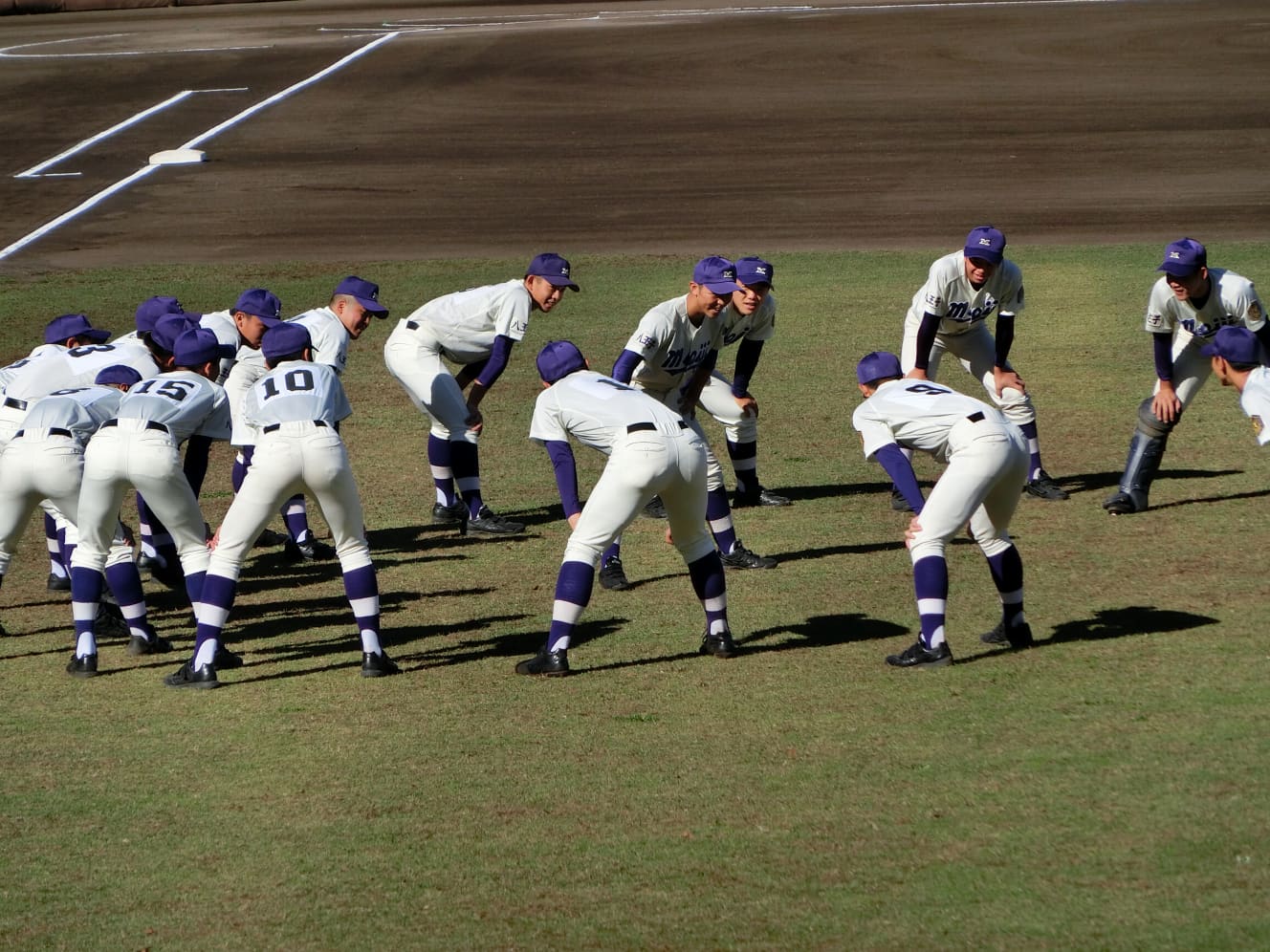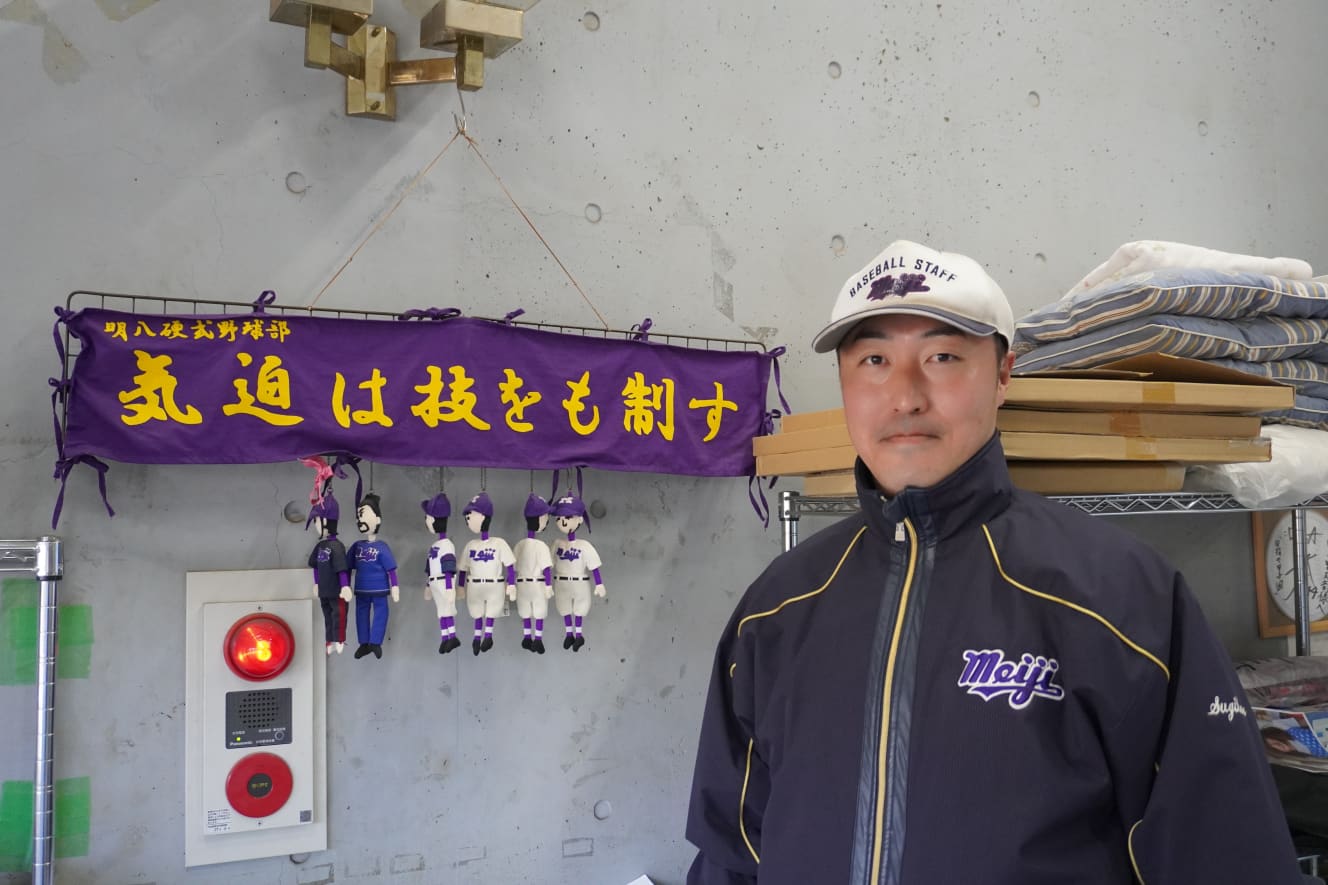How to talk with adults and children as equals, as practiced by a progressive school aiming for the Koshien National High School Baseball Tournament
The Story of the Meihachi Baseball Club (4)
He is one step short of his dream. Despite the restrictions placed on him by his school, which is one of the best preparatory schools in Tokyo, there is a man who still earnestly aims to make it to the Koshien National High School Baseball Championship. He is Takafumi Sugihara, manager of the Meio Nakano Hachioji Baseball Club. This documentary follows his struggles and anguish, as well as the physical and mental growth of his students, over a period of 180 days.

The Meio Nakano Hachioji High School baseball team and its manager, Takafumi Sugihara, were in the Tokyo Metropolitan High School Baseball Tournament for the fall season with a chance to participate in the 94th Annual High School Baseball Invitational Tournament. The team was not quite ready for the tournament, but Sugihara never loosened the reins on his students during the tournament, and some of them showed significant changes.
Sugihara’s passion began to show through.
From the first game against Suginami High School in the first round of the block qualifiers, Sugihara’s policy of running the bases boldly to get to the first base was on full display.
The team started off with a sluggish start, allowing a single run in the top of the 2nd inning due to an error, but they attacked aggressively in the bottom of the 3rd inning. The first batter, freshman Shotaro Shindo, led off the inning with a dead ball, and the next batter, Koshiro Nishikawa, hit a run-ending hit. He returned to first base on a fly out to second, but on the third pitch by the next batter, Yusuke Yotsumata, Shindo started stealing bases.
The result is an out and no runners on with two outs, but Yotsukata reaches base on an error by the shortstop and successfully steals a base on the second pitch. By moving, they regain their rhythm. Then Ryo Oshima hit a timely tying run. In the bottom of the 4th inning, Keiyu Shinozaki drew a walk, stole a base with one out, and touched up on Yotsugata’s right fly after Nishikawa walked to put runners at 1st and 3rd with two outs. When Oshima was driven in on a count of two strikes, Nishikawa got a start and was sandwiched in between, while Shinozaki ran out with perfect timing to bring him home alive. This was the “no-hit, one-run game” advocated by the pitching staff.
After that, they continued to score runs by stealing bases, but what was even more characteristic of Meihachi was the way they kept an eye on the opposing fielder until the ball returned to the pitcher, so as not to miss any opening.
The rapid growth of a first-year player who was all about himself in junior high school
In the first round of the tournament against Toyo High School, after a 9-4 win against Suginami and a cold win against Kita Toshima Technical High School, a symbolic scoring scene took place. The team scored two runs in the top of the 8th inning, and the next run was the one they really wanted. With one out and Oshima on second, Haruto Watanabe hit a ball to left field.
The runner at second was not able to come home, but he turned his head to face left to visually check the play just in time for Oshima to catch the ball. Seeing the ball out of his hands, he kicked it to third base without hesitation, creating the sixth run.

In the next game against Toyonan in the second round, there was also a good base runner, Shikata, who hit a ball in front of center that went through two playgrounds and stole second base. The bat was swinging better and better with each game, and he was active with 16 hits in both the Toyo and Toyonan games. This was beyond Sugihara’s expectations.
The batting lineup was led by Hosaka, whose batting form had been solidified since the tournament, and by Shikata, who had two or more hits in every game he played in. Shindo, who also played defense, was very active. Sugihara, too, has seen the change.
Shindo was very energetic in junior high school, but from the beginning of September he was the first one to come out to the field among the first-year players, and he swung the bat enthusiastically during morning practice. I think some of his efforts have paid off, and he has been asking his fellow students, ‘Is your shoulder okay? I also felt that he has grown as a human being. I think Shindo changed the most during the fall tournament.

Shindo also had three hits in the third game against fourth-seeded Komae Tokyo Metropolitan High School. However, an unexpected error in the bottom of the 8th inning with a one-run lead allowed the score to be tied, and although they scored two runs in the top of the 9th inning, they were caught up again in the bottom of the inning to send the game into extra innings. In the last inning, even though there was a strong wind, they were unable to catch a catchable fly ball, and lost in the 10th inning. They could not recover from their mistakes. If they had won, it was very likely that Meihachi would have been nominated for the 21st Century Boundary Games, but they finished the first official tournament of this team in the top 16.
One step closer to the “21st Century Boundary Recommendation School
I am very sorry for my lack of experience, which came out at a crucial point. When we lost, my mind went blank. To be frank, it was a humiliating loss, and I couldn’t go home with my face up. We wanted to make it to the top eight, which we did in the spring and summer of last year. I wanted them to think, ‘We can do it, too. If we had the title of “21st Century Recommendation School,” it might have given us more confidence.
I myself was in such a hurry that I failed to build a team. I only put up appearances and put up a facade. That’s fine when things are going well, but when things go bad, it’s easy to lose your skin. There were some players whom I removed from the bench because I could not see their potential, and I regretted my decision after the tournament. It was a tournament that left me with a lot to reflect on.”
Sugihara did not hide his regret, but he also had conflicting feelings.
He did not hide his frustration, but at the same time he had a contradictory feeling: “We just don’t want them to think we are satisfied with the way the team played. In the bottom of the ninth inning against Komae, a hit batter and a dead ball with two outs put runners at first and second, and a hit to center field scored a run, putting runners at first and third. We had been practicing defensively not to let the runner on first base advance to third when there was a one-hit batter on first or second. I failed to do so and allowed him to advance to third base. What’s practice?” That’s what I mean. The next meeting was a long one.”
However, as he spoke, Sugihara’s face looked as if he was enjoying himself. It is true that we made many mistakes, but we were able to express ourselves well. Sugihara also said, “After all, games are very important. As Sugihara reflected, “I felt again the importance of letting the students experience the game.
Make positive mistakes.”
In order to encourage the students’ growth, Sugihara also played “tricks” while chasing the victory in front of him.
For example, in the game against Toyo, he instructed his students to stand in front of the batters and to position themselves in front of the lineup, but he also told them to “do what you have to do and make positive mistakes. It is fine to aim for the front and get outs. Don’t make it a meaningless game,” he said, and left the first round to the players. It didn’t go well, and Sugihara took the lead after that, but he made the students think about their own baseball in a situation where losing would be the end.
In the game against Suginami, when a substitute runner was considered, he asked, “Who is going to be the substitute runner here?” to the bench members and asked them to appeal.
Sugihara usually makes his students assert themselves. You can’t get a chance or a regular position by waiting for it. You have to find them and make them by yourself. This is true not only in the baseball team but also in their future life.
In the fall, the regular shortstop, Rando Kaneko, is a good defender, but his batting ability is not good. In that case, he will need to bat in his place. If he gets on base, he may need to be substituted out. And we will need a player to take over the defense after that. Considering these things, he looks at himself objectively and decides how he will work hard. Then, I want them to appeal and seize their opportunities.
The open competition after the fall tournament provides the perfect opportunity for students to do so. Students who didn’t play much in the tournament or didn’t make the bench are mainly used, and their positions are shuffled once again.
Fostering independence by asking a lot of questions
During an open game one day, the following exchange was observed. In the middle of the game, Sugihara was in the manager’s office, having left the leadership to the players, when Jun Yamakawa, a second-year pitcher who had not been on the bench in the fall, came to him.
He asked Sugihara, “What should we do about the next pitcher to take over?
Sugihara replied in his usual tone, “What do you want to do? I ask. Yamakawa replied
I want to pitch.”
And then, a single word. Sugihara said, “And? The team was at a loss for a response. Sugihara helped him out by saying, “Okay, from the 4th inning.
Yes.
The only reply was, “I’m sorry, I don’t know. Sugihara again said, “And? I ask, “What is it? Yamakawa still could not grasp the intent of the question. How many times are you going to throw? Sugihara’s voice said
Fourth through sixth innings.
Sugihara is not finished yet. Is the sixth inning enough? Why don’t you throw more?” Yamakawa replied with a beaming “Yes,” and returned to the field. He returned to the field. Perhaps he wanted Sugihara to say, “I will throw more pitches,” but Sugihara’s expression was also very soft as he watched him leave the field.

I was reminded of the first promise Sugihara makes to the parents of his students.
In three years, I will make sure that they can talk to adults on equal terms.
Sugihara is serious about his students, both as a director and as an educator. His students are growing up at different speeds.
After the fall open competition, Sugihara said, “Everyone reveals their true nature when they are pushed too hard. We push them hard in tough practices to bring out their true selves.
(Continued in Part 5)